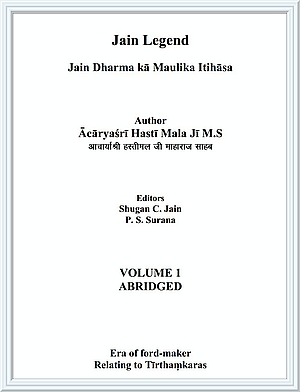Following Lord Supārśvanātha, Śrī CandrAprabha Swāmī became the 8th Tīrthaṃkara. In his previous incarnation as king Padma of Maṃgalāvatī city in Dhātakīkhaṇḍa, he practised various austerities and consequently developed detachment and taking initiation from the monk Yugandhara he practiced right conduct and by 20 instruments (sthānakas) gained the Tīrthaṃkara nāmakarma (karmas responsible for embodiment). At the end of his lifespan he became a powerful god in Vijaya palace.
From Vijaya his soul descended into the womb of Sulakṣaṇā, queen of king Mahāsena of Candrapurī on the fifth day of the dark fortnight of Caitra month under the Anurādhā constellation. The queen saw the 14 highly auspicious dreams that same night. After completing her pregnancy queen Sulakṣaṇā gave birth to a jewel of a son at the midnight hour on the 11th (12th) day of the dark half of the Pauṣa month under Anurādhā constellation. His birth ceremony was celebrated with great pomp and joy by the gods and celestial beings on the Ati-PāṇduKaṃbala hillock.
Inviting people to his son's naming ceremony on eth 12th day king Padmasena said the pregnancy whim of the boy's mother was to enjoy the moon and the child's body reflects the aura of the moon, hence the boy is named Candraprabha.
When Candraprabha became a young man the king got him married to suitable princesses. After remaining a prince for two-and-a-half lakh pūrvas he was crowned king and he conducted the affairs of the kingdom for a little more than 6 lakh pūrvas and propagated righteousness. Realising the futility of the worldly pleasures the Lord resolved to get initiated as a monk. Upon prayers by the lokāntika gods and a year's giving of charities, he observed a ṣaṣṭambhakta fast with thousand other kings. On the 12th day of the dark half of the Pauṣa month under Anurādhā constellation, completely ridding himself of all bad karmas Lord Candraprabha was initiated into monkhood. The next day he broke the fast at the house of Somadatta, the king of Padmakhaṇḍa by accepting milk, the gods showered five kinds of rain and established the importance of charity / donations.
Wandering for three months as mendicant Candraprabha reached Sahasrāmravana. There he went into a deep meditative state under the Priyaṃgu tree. On the 7th day of the dark fortnight of the Fālguna month, destroying four obscuringkarmas including knowledge deluding, he attained poure intuition and pure knowledge. Then in a large gathering of gods and men gave a sermon about śruta and caritra dharma (scripture and conduct) and re-established the four-fold order. Remaining omniscient for a little less than 1 lakh pūrvas the Lord blessed all beings.
His congregation had 93 gaṇas and Gaṇadharas, 10000 omniscient, 8000 telepaths, 8000 clairvoyants, 2000 14-pūrvadhārīs, 14000 vaikriyalabdhidhārīs, 7600 Vādīs, 250000 monks, 380000 female-monks, 250000 votaries and 491000 female-votaries.
When the Lord saw his end approaching, he fasted for a month on Sammetaśikhara along with 1000 monks and in unobstructed meditation (state of inactivity or 14th guṇasthāna) he destroyed the remaining four non obscuring karmas and on the 7th day of the dark fortnight of Bhādrapada under Anurādhā constellation, he attained enlightenment and nirvāṇa.
His age was 10 lakh pūrvas out of which he spent two-and-a-half lakh pūrvas as prince, three-and-a-half lakh pūrvas as king, and a little less than 1 lakh pūrvas as mendicant before attaining liberation.
 Acharya Hasti Mala
Acharya Hasti Mala
